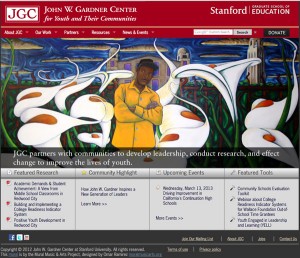 The John W. Gardner Center for Youth and Their Communities at the Stanford Graduate School of Education recently announced that it was selected to play a key role in a major effort to break the cycle of poverty in San Francisco’s Mission District. It was chosen to do the research and evaluation on the efforts to be launched under a new $30 million federal “Promise Neighborhood” grant.
The John W. Gardner Center for Youth and Their Communities at the Stanford Graduate School of Education recently announced that it was selected to play a key role in a major effort to break the cycle of poverty in San Francisco’s Mission District. It was chosen to do the research and evaluation on the efforts to be launched under a new $30 million federal “Promise Neighborhood” grant.
This is the latest in a series of community projects for the Gardner Center, which has a long history of conducting actionable research in San Francisco and other communities in the Bay Area and beyond. It has worked with San Francisco Unified School District, City College of San Francisco and other community groups and agencies in the Mission Promise Neighborhood initiative.
“The Gardner Center welcomes this opportunity to expand upon our work in San Francisco to strengthen conditions and experiences for children and families in the Mission,” said AMY GERSTEIN, executive director of the Gardner Center. “We look forward to working with the Mission Promise Neighborhood team, as well as all of the partners on this essential project.”
The $30 million grant was awarded by the U.S. Department of Education in December to San Francisco’s Mission Economic Development Agency (MEDA), which in turn brought in the Gardner Center as one of its partners.
The grant will allow MEDA to build a continuum of community services that bridge local nonprofits and public and private partners to work with kids and families to break the cycle of poverty and ensure every child can reach his or her full potential, from cradle to college to career.
The Gardner Center brings distinct research and evaluation expertise to the project. It has, for instance, developed a unique Youth Data Archive that draws longitudinal data from different sources that are often unable to share their data directly with each other. This approach enables research and analysis that reaches across a variety of sectors, from schools to city agencies and nonprofits.
“Children must be safe, healthy and supported by adults across an entire community to reach their fullest potential,” said U.S. Secretary of Education Arne Duncan. “Against all odds, Promise Neighborhoods work to provide families and children with the support they need to help break the cycle of poverty that threatens too many of our nation’s communities.”
—JONATHAN RABINOVITZ, director of communications, Graduate School of Education